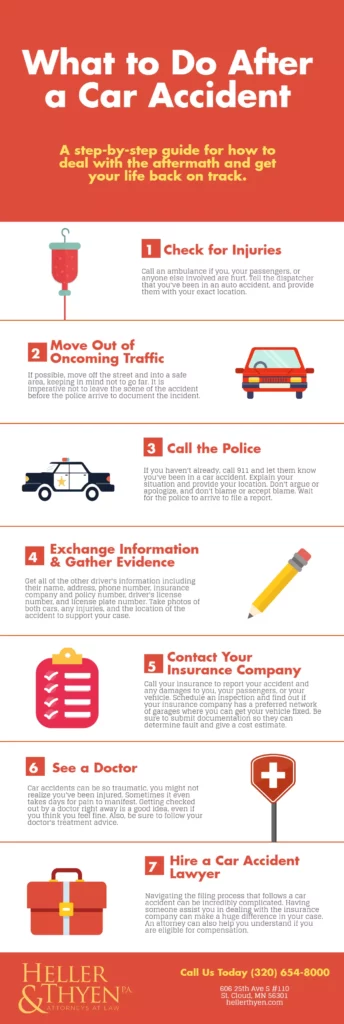Minnesota Car Accident Lawyers
Unfortunately, car accidents are part of everyday life. Most car accidents, are an annoying inconvenience, where the only damage is to a bumper or scratched paint. However, that is not always the case. Car accidents can also cause serious and life changing injuries. For those occasions, it is important to make sure that your rights are protected. If you have been injured in an accident, call us to learn about your rights.
Car accidents are the leading cause of traumatic brain injuries and spinal injuries. These injuries can lead to permanent disability, mental and physical impairments, long-term financial stress, emotional pain, physical damages and even death.
Long-term physical injuries sustained in a car accident might not be present immediately or in their full severity for several months. Sometimes what might start out as a minor injury with minimal pain can develop into permanent or long term back pain, neck pain, herniated discs, ruptured discs internal organ damage or traumatic brain injury.
About Car Accident Claims
In Minnesota, people who are involved in car accidents, have three separate potential claims: property damage, no-fault and personal injury, also known as bodily injury.
Filing for Chapter 7 initiates the “automatic stay” – which is an immediate protection for you. It will stop wage garnishments, creditor harassment, and will provide temporary relief to home foreclosure proceedings and car repossessions. Mortgage companies and automobile lenders will continue to accept monthly payments on the debts owed to them, as long as you remain current.
Ask A Question
Property Damage:
The first type of claim is compensation to repair or replace a damaged vehicle or other personal property. If you are not at-fault for your accident, usually, the at-fault driver’s insurance company will pay for the damage to your vehicle. However, if you have full (comprehensive) coverage on your vehicle, you have the option to go through your own insurance company to pay for your damage. Your insurance company will then go after the at-fault driver’s insurance company to get reimbursed. You may have to pay a deductible if you work directly with your insurance company, which is often times reimbursed to you. If you are at-fault for your accident, your property damage is covered only if you had full (comprehensive) coverage on your vehicle.
It is very important that you take photographs of the damage to your vehicle as soon as possible. If you are able to take photographs of both vehicles while at the scene, do so.
Generally, the insurance company will pay for repairs to your car. You can take it to any body shop you wish to get an estimate or do the repairs. Sometimes an insurance company will suggest a body shop, and you can go there if you wish. If your car is repaired, make sure you inspect it at the time it is completed and let them know immediately if the repair job was in any way inadequate.
A car with significant damage may be declared a “total loss”. That means that the cost of repairs exceeds approximately 70% of the fair market value of the car. In this situation, there are a few things you should do to ensure that you maximize your recovery. First, you should figure out what the car is worth before you hold any discussions with the property adjuster. Get a private party value from Kelly Blue Book (kbb.com) or NADA (nada.com). You should also go to at least one car dealership and ask them how much they would price a similar car. Getting this baseline of your car’s values ensures that you are being treated fairly when you negotiate.
Finally, if you have recently done repairs on your car, such as new tires, new brakes, a transmission rebuild or other, non-regular maintenance work, give the receipts to the adjuster. They may increase the amount of money they offer you.
If you lost other personal property during the accident, make sure you save the broken/damaged items and show them to the adjuster. They may reimburse you for those items as well. This may include eye glasses, clothing, cell phones, laptop computers, car seats or other similar items.
If your car has a salvage title, the value of your car may be significantly reduced. The salvage title means that the vehicle was previously deemed a “total loss” by an insurance company. Therefore, the insurance company will not compare it to a similar vehicle with a clear title (not salvaged).




